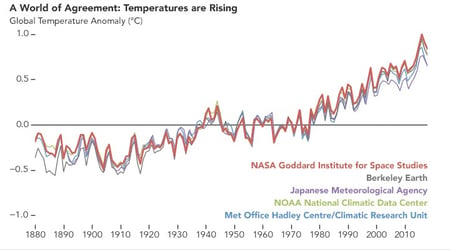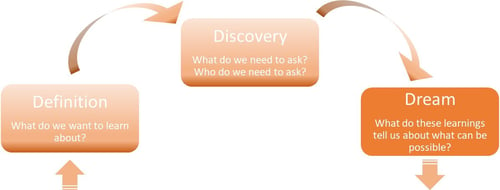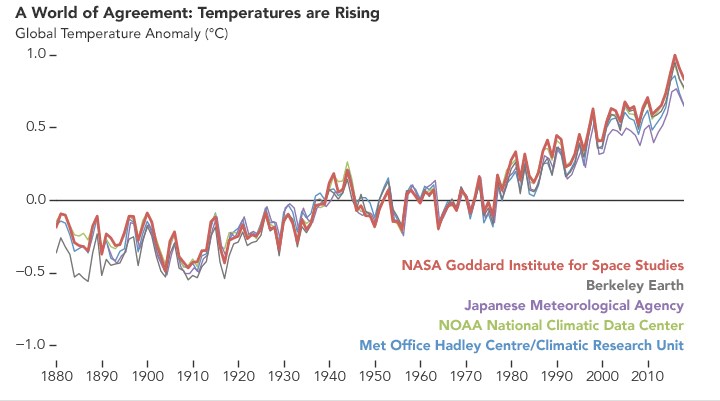Appreciative Inquiry: Dream
“Let us make our future now, and let us make our dreams tomorrow's reality.” (Malala Yousafzai)[1]
Global warming has become climate change has become climate crisis has become climate disaster. Temperature data from five independent organizations around the globe clearly demonstrate rising temperatures with the harmful effects on full display. And the evidence against human activity is damning. “Multiple studies published in peer-reviewed scientific journals show that 97 percent or more of actively publishing climate scientists agree*: Climate-warming trends over the past century are extremely likely due to human activities.”[2],[3]

Temperature data showing rapid warming in the past few decades, the latest data going up to 2018. According to NASA data, 2016 was the warmest year since 1880, continuing a long-term trend of rising global temperatures. The 10 warmest years in the 139-year record all have occurred since 2005, with the five warmest years being the five most recent years. Credit: NASA's Earth Observatory.
“Because climate change is a truly global, complex problem with economic, social, political and moral ramifications, the solution will require both a globally-coordinated response (such as international policies and agreements between countries, a push to cleaner forms of energy) and local efforts on the city- and regional-level (for example, public transport upgrades, energy efficiency improvements, sustainable city planning, etc.). It’s up to us what happens next.”[4]
It is up to us what happens next. Humans have developed restorative technologies to help mitigate the effects of our harmful actions, of the harmful technologies also developed by humans. We already have much of the know-how. Do we have the strength of character, the discipline, the desire to deliver on our duty as stewards of the earth?
“Let us make our future now, and let us make our dreams tomorrow's reality.”
Can Appreciative Inquiry be one tool to join the world in this cause? The Dream phase of Appreciative Inquiry encourages us, humans from around the earth representing our global diversity, to optimistically imagine our future world state. The Dream phase builds upon the work done to define the question – the focus – and the exploration, or discovery, of where we currently are.

The focus: Climate crisis mitigation.
The discovery: Human activity is leading to increasing global temperatures. We have technologies to mitigate these effects, to heal our planet.
The dream: We can establish global policies that support wide-spread adoption of helpful technologies while displacing harmful technologies to heal our earth, our home.
In the Next Issue
In the next few posts, we will continue to explore how Appreciative Inquiry might be a vital component for shifting how, when, why, and where energy is used by diving more deeply into the Five D’s. I would love to hear from others!
[1] If you are wanting to feel deeply inspired and hopeful, read more quotes from Malala Yousafzai here: https://www.awakenthegreatnesswithin.com/35-inspirational-malala-yousafzai-quotes-on-success/
[2] NASA Global Climate Change Vital Signs of the Planet, Scientific Consensus: Earth's Climate is Warming, https://climate.nasa.gov/scientific-consensus/
[3] J. Cook, et al, "Consensus on consensus: a synthesis of consensus estimates on human-caused global warming," Environmental Research Letters Vol. 11 No. 4, (13 April 2016); DOI:10.1088/1748-9326/11/4/048002
[4] NASA Global Climate Change Vital Signs of the Planet, Is it too late to prevent climate change?, https://climate.nasa.gov/faq/16/is-it-too-late-to-prevent-climate-change/
About This Blog
We are on the brink of an evaluation renaissance. Smart grids, smart meters, smart buildings, and smart data are prominent themes in the industry lexicon. Smarter evaluation and research must follow. To explore this evaluation renaissance, I am looking both inside and outside the evaluation community in a search for fresh ideas, new methods, and novel twists on old methods. I am looking to others for their thoughts and experiences for advancing the evaluation and research practice.
So, please…stay tuned, engage, and always, always question. Let’s get smarter together.

